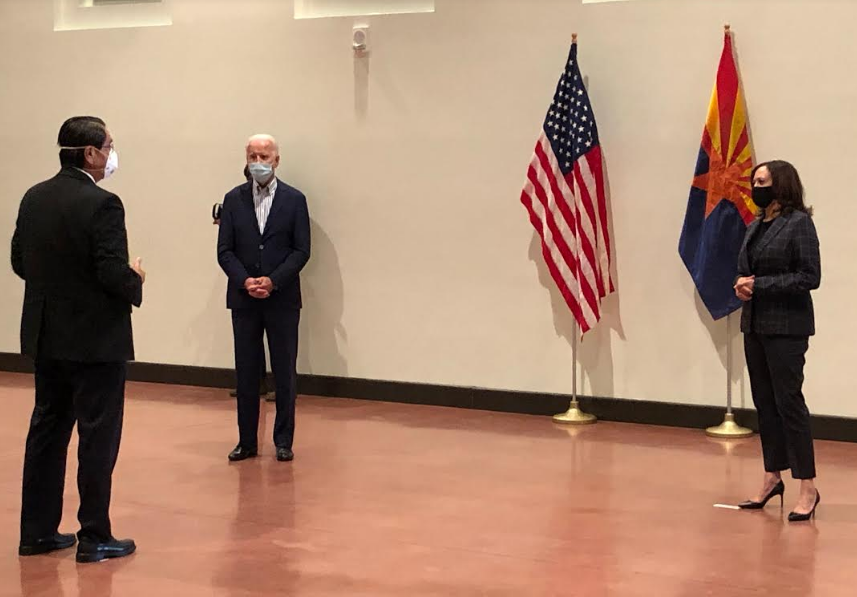
- Details
- By Native News Online Staff
PHOENIX — The top of the Democratic ticket took their campaign to Arizona on Thursday.
While in Phoenix, Ariz., Democratic presidential nominee former vice president Joe Biden and vice presidential nominee Sen. Kamala Harris (D-CA) met with several Arizona tribal leaders.
In attendance were Navajo Nation President Jonathan Nez, Tohono O'odham Nation Chairman Ned Norris, Jr. Gila River Indian Community Governor Stephen Roe Lewis, Hopi Tribal Chairman Timothy Nuvangyaoma, and San Carlos Apache Tribal Chairman Terry Rambler.
“Today’s meeting sends a message to all of Indian Country that the Biden-Harris team is ready to work together with all tribes, including the Navajo Nation. As the first people of this country, we have to let our voices be heard at the highest levels of government when it comes to issues that impact our people and our communities. With the previous Obama-Biden Administration, tribal nations had a seat at the table throughout their two terms in office and that’s what the Biden-Harris team is willing to restore if elected to office,” President Nez said. “Today was a great opportunity to engage with former Vice President Biden and Senator Harris, to let them know our priorities based on the special government-to-government relation that tribes have with the federal government.”
The Biden for President campaign committee released the Biden-Harris Plan for tribal nations to uphold the United States’ trust responsibility to Tribal nations, strengthen the Nation-to-Nation relationship between the United States and Indian Tribes, and work to empower tribal nations to govern their own communities and make their own decisions.
READ THE FULL BIDEN-HARRIS PLAN FOR TRIBAL NATIONS HERE
“I am pleased to provide my personal support and endorsement to Vice-President Biden and Senator Harris to be our next President and Vice President of the United States. Their plan for tribal nations, and their record over decades of service make it clear that they understand Tribal sovereignty and their trust responsibilities to Tribes and that they will tackle our challenges head-on if elected. It is my belief that the team of Biden-Harris will provide the necessary leadership to lead Indian Country out of the COVID-19 pandemic and into the next decades of self-determination,” Gila River Indian Community Gov. Stephen Roe Lewis said.
During the discussion with Biden and Harris, President Nez highlighted the need for federal partners to work with the Navajo Nation to move forward with infrastructure development projects to provide clean water, electricity, broadband, and roads for more Navajo people. Among other priorities, he also spoke about the need to improve the health care system for tribes to improve health disparities, supporting economic development, educational priorities, remediating uranium mining sites, water rights settlements, solid waste management, and improving public safety.
The Biden for President campaign stop in Arizona was no accident. The state is a battleground state with the prize of 11 electoral votes. On Thursday, Biden was leading President Trump by 4 percent as of Thursday. Trump won the 11 electoral votes in 2016 when he won the state popular vote by 3.5 percent.
Four Directions, a Native American advocacy group advancing equality at the ballot box across Indian Country, is one of seven states where the Native vote can influence the results on election day. Arizona has 324,955 American Indians of voting age.
More Stories Like This
Native News Weekly (August 25, 2024): D.C. BriefsUS Presidents in Their Own Words Concerning American Indians
Native News Online Marks 15 Years of Warrior Journalism
I’m a Minneapolis Postal Worker. This Is What I Saw.
Next on Native Bidaské: Inside Dark Winds with the Cast of Season 4
Help us defend tribal sovereignty.
At Native News Online, our mission is rooted in telling the stories that strengthen sovereignty and uplift Indigenous voices — not just at year’s end, but every single day.
Because of your generosity last year, we were able to keep our reporters on the ground in tribal communities, at national gatherings and in the halls of Congress — covering the issues that matter most to Indian Country: sovereignty, culture, education, health and economic opportunity.
That support sustained us through a tough year in 2025. Now, as we look to the year ahead, we need your help right now to ensure warrior journalism remains strong — reporting that defends tribal sovereignty, amplifies Native truth, and holds power accountable.
 The stakes couldn't be higher. Your support keeps Native voices heard, Native stories told and Native sovereignty defended.
The stakes couldn't be higher. Your support keeps Native voices heard, Native stories told and Native sovereignty defended.
Stand with Warrior Journalism today.
Levi Rickert (Potawatomi), Editor & Publisher

